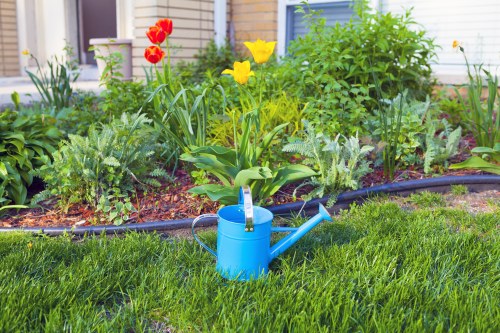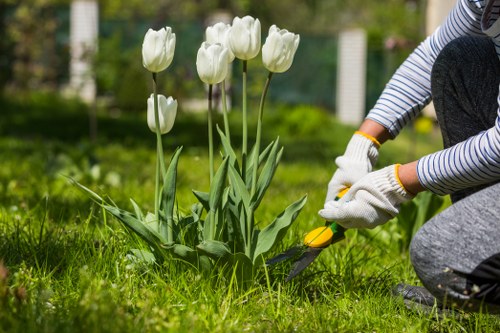Comprehensive Guide to Garden Maintenance in Forest Hill

Garden maintenance in Forest Hill is essential for keeping your outdoor spaces beautiful, healthy, and vibrant throughout the year. Whether you're a seasoned gardener or a beginner, understanding the specific needs of your garden in this region can make all the difference. Forest Hill's unique climate and soil conditions require tailored approaches to ensure your plants thrive.
Regular maintenance not only enhances the aesthetic appeal of your garden but also promotes plant health, reduces the risk of pests and diseases, and increases the overall value of your property. In this article, we will explore the best practices for garden maintenance in Forest Hill, highlight essential tasks, and provide tips to keep your garden in top shape.
From soil preparation and planting schedules to pruning techniques and pest management, we cover all aspects of garden care suitable for the Forest Hill area. Whether you have a small backyard or a large estate, these guidelines will help you maintain a lush and thriving garden all year round.

Understanding the Forest Hill Climate
Forest Hill experiences a temperate climate with distinct seasons, which significantly influences garden maintenance strategies. The region typically has mild summers and cool winters, with adequate rainfall spread throughout the year. This climate is conducive to growing a wide variety of plants, including perennials, shrubs, and trees.
Key Climatic Factors:
- Temperature variations throughout the year
- Average annual rainfall and distribution
- Soil types and drainage patterns
- Sunlight exposure and shading
Understanding these factors is crucial for selecting the right plants and scheduling maintenance tasks effectively. For instance, knowing the frost dates helps in timing your planting and protecting sensitive plants during colder months.
Soil Health:
Forest Hill's soil varies from sandy to loamy, providing suitable conditions for different types of gardens. Regular soil testing and amendments can improve fertility and structure, ensuring your plants receive the necessary nutrients.

Essential Garden Maintenance Tasks
1. Soil Preparation and Fertilization
Healthy soil is the foundation of a thriving garden. Begin by testing your soil's pH and nutrient levels to determine any deficiencies. Amending the soil with compost, manure, or organic fertilizers can enhance its fertility and structure.
Steps for Soil Preparation:
- Conduct a soil test to assess pH and nutrient levels.
- Add organic matter to improve soil texture and fertility.
- Incorporate appropriate fertilizers based on test results.
- Ensure proper drainage to prevent waterlogging.
Regular fertilization supports plant growth, flowering, and fruiting. Choose fertilizers that match the specific needs of your plants, whether they require high nitrogen for leafy growth or higher phosphorus for blooming.
2. Planting and Pruning
Strategic planting and proper pruning are vital for maintaining garden structure and plant health. Planting at the right time of year ensures better establishment and growth.
Planting Tips:
- Choose native or well-adapted plant species.
- Consider plant height and spread to avoid overcrowding.
- Space plants adequately to allow for air circulation.
Pruning helps remove dead or diseased branches, shape plants, and promote better air flow. It's important to prune at the correct time to avoid stressing the plants and to encourage healthy growth.
3. Watering and Irrigation
Proper watering is crucial for plant health. Forest Hill's rainfall may reduce the need for frequent watering, but establishing an efficient irrigation system is beneficial, especially during dry spells.
Watering Best Practices:
- Water early in the morning to minimize evaporation.
- Use drip irrigation or soaker hoses to target the root zone.
- Mulch around plants to retain moisture and reduce weed growth.
Adjust watering schedules based on seasonal changes and specific plant requirements. Overwatering can lead to root rot and other issues, so it's important to monitor soil moisture levels regularly.

Pest and Disease Management
Forest Hill gardens are susceptible to various pests and diseases that can hinder plant growth and health. Effective pest and disease management strategies are essential to maintain a vibrant garden.
Common Pests:
- Aphids
- Spider mites
- Slugs and snails
- Caterpillars
Integrated Pest Management (IPM):
IPM is a sustainable approach that combines biological, cultural, and chemical methods to control pests. Start by monitoring pest populations and identifying the specific threats to your garden.
IPM Strategies:
- Encourage beneficial insects like ladybugs and predatory beetles.
- Use physical barriers such as nets and fences.
- Apply organic pesticides as a last resort.
- Maintain garden hygiene to eliminate pest habitats.
Regularly inspect plants for signs of pests and diseases to catch issues early and prevent widespread damage.
Fungal and Bacterial Diseases:
Common diseases in Forest Hill gardens include powdery mildew, root rot, and bacterial leaf spot. Proper spacing, pruning, and watering techniques can minimize the risk of these diseases.
Removing and disposing of infected plant material helps prevent the spread of diseases. In some cases, applying fungicides may be necessary to control outbreaks.

Seasonal Garden Maintenance
Each season in Forest Hill brings its own set of gardening tasks. Adapting your maintenance routine to seasonal changes ensures that your garden remains healthy and attractive year-round.
Spring Maintenance:
- Clean up garden beds and remove winter debris.
- Prune shrubs and trees to encourage new growth.
- Plant spring-flowering bulbs and annuals.
- Start a regular watering schedule as temperatures rise.
Summer Maintenance:
Summer requires diligent care to cope with heat and occasional droughts. Focus on:
- Regularly watering and mulching plants.
- Monitoring for pests and diseases.
- Deadheading flowers to promote continuous blooming.
- Pruning to maintain plant shape and health.
Fall Maintenance:
Fall is ideal for preparing your garden for the winter months. Tasks include:
- Planting perennials and spring-flowering bulbs.
- Raking leaves and composting organic matter.
- Pruning trees and shrubs after they have finished blooming.
- Protecting tender plants from early frosts.
Winter Maintenance:
While growth slows in winter, maintaining your garden is still important:
- Protect plants from frost with mulches and covers.
- Plan and design your garden layout for the upcoming year.
- Prune dormant trees and shrubs if necessary.
- Maintain garden tools and equipment.
Choosing the Right Plants for Forest Hill
Selecting plants that are well-suited to Forest Hill's climate and soil conditions is crucial for successful garden maintenance. Native plants often require less maintenance and are more resistant to local pests and diseases.
Popular Plant Varieties:
- Rhododendrons and azaleas
- Hostas and ferns
- Japanese maples and dogwoods
- Lavender and sage
- Ornamental grasses and perennials
Tips for Plant Selection:
- Choose plants with similar water and light requirements.
- Consider the mature size of plants to avoid overcrowding.
- Incorporate a mix of evergreen and deciduous plants for year-round interest.
- Select plants that provide habitat and food for local wildlife.
By carefully selecting the right plants, you can create a resilient and beautiful garden that thrives with minimal maintenance.
Implementing Sustainable Gardening Practices
Sustainable gardening not only benefits the environment but also reduces maintenance efforts in the long run. Implementing eco-friendly practices can lead to a healthier garden and a more sustainable lifestyle.
Key Sustainable Practices:
- Using organic fertilizers and pesticides.
- Collecting and recycling rainwater for irrigation.
- Composting kitchen and garden waste.
- Planting native and drought-tolerant species.
- Creating habitats for beneficial insects and wildlife.
Benefits of Sustainable Gardening:
Sustainable practices improve soil health, reduce water usage, and minimize the need for chemical interventions. Additionally, they contribute to biodiversity and create a more balanced ecosystem in your garden.
Composting and Soil Health:
Composting organic waste recycles nutrients back into the soil, enhancing its fertility and structure. A healthy soil ecosystem supports strong plant growth and resilience against pests and diseases.
Water Conservation Techniques:
Implementing water-saving techniques such as mulching, drip irrigation, and rainwater harvesting can significantly reduce water consumption. These methods ensure that your plants receive adequate moisture while conserving this precious resource.
Local Garden Maintenance Services in Forest Hill
For those who prefer professional assistance, numerous garden maintenance services operate in Forest Hill. These experts offer a range of services tailored to meet the specific needs of your garden.
Benefits of Hiring Professional Services:
- Expert knowledge of local plant species and climate conditions.
- Time-saving and efficient maintenance.
- Access to specialized tools and equipment.
- Personalized garden care plans.
Professional garden maintenance can include tasks such as regular mowing, pruning, pest control, fertilization, and seasonal clean-ups. Hiring a reputable service ensures that your garden receives consistent and high-quality care.
Choosing the Right Service Provider:
- Check for certifications and experience.
- Read reviews and seek recommendations.
- Ensure they offer the services you need.
- Compare pricing and service packages.
By selecting a reliable garden maintenance company, you can enjoy a beautiful and well-kept garden without the hassle of doing it all yourself.
Closest Areas to Forest Hill for Garden Maintenance Services
Forest Hill is surrounded by several nearby areas that also benefit from excellent garden maintenance services. Here are the top areas you can consider:
- North Forest Hill: Located just north of Forest Hill, this area offers a variety of gardening services specializing in both residential and commercial properties.
- South Forest Hill: Known for its lush landscapes, gardeners here focus on creating sustainable and eco-friendly gardens.
- East Forest Hill: This region is popular for its ornamental gardens and offers expert pruning and plant selection services.
- West Forest Hill: Offering comprehensive garden maintenance, including irrigation and pest management solutions.
- Greenwood: Adjacent to Forest Hill, Greenwood gardeners are renowned for their creative landscape designs and maintenance.
- Lakeside: Specializes in water-efficient gardening and maintaining aquatic plants in lakeside gardens.
- Meadowbrook: Focuses on meadow-style gardens with a mix of native plants and wildflowers.
- Brookside: Known for its garden pathways and hardscape maintenance, Brookside offers unique garden care services.
- Maplewood: Offers seasonal garden maintenance, ensuring gardens are beautifully maintained throughout the year.
- Sunnyvale: Specializes in sunny gardens, providing expertise in drought-tolerant and sun-loving plant species.
- Riverside: Provides specialized services for riverbank gardens, focusing on erosion control and native river plants.
- Willow Grove: Known for maintaining lush, green gardens with a variety of ornamental and shade plants.
- Hillcrest: Offers hilltop garden maintenance services, including terracing and slope stabilization gardening techniques.
Each of these areas surrounding Forest Hill has its unique features and specialties, ensuring that you can find the perfect garden maintenance service tailored to your specific needs.
Advanced Garden Maintenance Techniques
For avid gardeners looking to take their garden maintenance to the next level, several advanced techniques can enhance garden health and productivity.
Mulching:
Mulching involves covering the soil with organic or inorganic materials to retain moisture, suppress weeds, and regulate soil temperature. Organic mulches like wood chips and straw also decompose over time, enriching the soil.
Crop Rotation and Companion Planting:
While more applicable to vegetable gardens, crop rotation and companion planting can improve soil fertility and reduce pest issues. Even in ornamental gardens, strategic planting can enhance plant health and diversity.
Pruning for Health and Shape:
Advanced pruning techniques, such as crown thinning and structural pruning, help maintain the health and aesthetics of trees and shrubs. Proper pruning promotes airflow, reduces disease risk, and encourages robust growth.
Integrated Irrigation Systems:
Investing in automated and integrated irrigation systems ensures efficient water usage and consistent plant hydration. These systems can be programmed to adjust watering schedules based on weather conditions.
Enhancing Garden Aesthetics
Maintaining a visually appealing garden involves more than just plant health. Incorporating design elements and thoughtful planning can transform your garden into a stunning outdoor space.
Landscape Design:
Effective landscape design considers the layout, color schemes, and plant varieties to create harmony and balance. Incorporating elements like garden paths, seating areas, and water features can enhance the overall appeal.
Color Coordination:
Choosing plants with complementary colors can create striking visual effects. Seasonal blooms ensure that your garden remains colorful throughout the year.
Lighting:
Outdoor lighting not only adds beauty but also extends the usability of your garden into the evening hours. Solar-powered lights and LED fixtures are energy-efficient options for illuminating pathways and garden features.
Garden Accessories:
Adding accessories such as decorative pots, sculptures, and garden furniture can personalize your garden and make it more inviting.
Maintaining Garden Tools and Equipment
Proper maintenance of garden tools and equipment is essential for efficient garden care and longevity of your tools.
Tool Care Tips:
- Clean tools after each use to prevent rust and corrosion.
- Sharpen blades regularly for effective cutting and pruning.
- Store tools in a dry, organized space to protect them from damage.
- Inspect tools for damage and replace any worn or broken parts promptly.
Investing in high-quality tools and maintaining them properly can save you time and effort in garden maintenance tasks.
DIY vs. Professional Garden Maintenance
Deciding between DIY garden maintenance and hiring professionals depends on several factors, including your expertise, time availability, and the complexity of your garden.
Benefits of DIY Maintenance:
- Cost-effective for those on a budget.
- Provides a sense of accomplishment and personal satisfaction.
- Allows for full control over garden care decisions.
Advantages of Professional Maintenance:
- Expert knowledge and experience.
- Time-saving, especially for large or complex gardens.
- Access to specialized tools and techniques.
- Consistent and reliable maintenance schedules.
Many homeowners find a hybrid approach effective, handling simple tasks themselves while outsourcing more demanding work to professionals.
Final Thoughts on Garden Maintenance in Forest Hill
Maintaining a garden in Forest Hill requires a combination of knowledge, planning, and consistent care. By understanding the local climate, choosing suitable plants, and implementing effective maintenance practices, you can enjoy a beautiful and thriving garden year-round.
Whether you opt for DIY maintenance or seek professional services, the key is to stay informed and proactive in addressing your garden's needs. Remember, a well-maintained garden not only enhances your living space but also contributes to the overall well-being and harmony of your surroundings.
Ready to transform your garden? Contact us today to book your garden maintenance service and let our experts help you achieve the garden of your dreams in Forest Hill.
